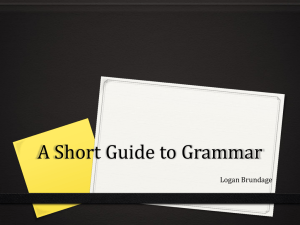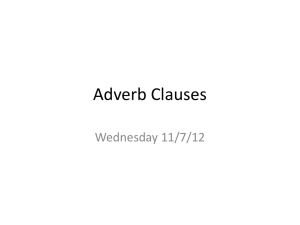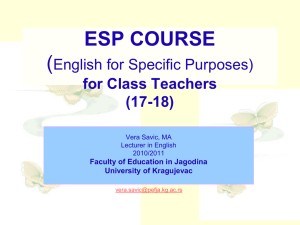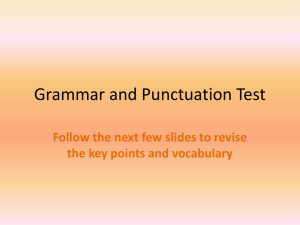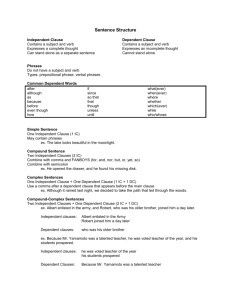Structure and Written Expression Sugi Iswalono
advertisement
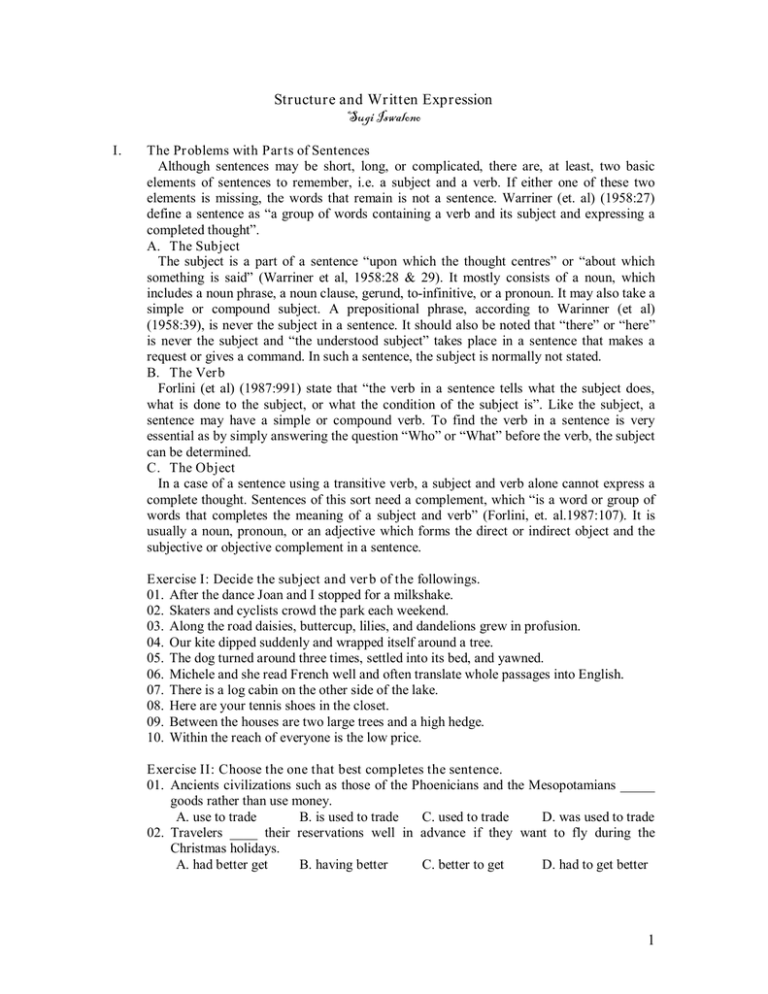
Structure and Written Expression Sugi Iswalono I. The Problems with Parts of Sentences Although sentences may be short, long, or complicated, there are, at least, two basic elements of sentences to remember, i.e. a subject and a verb. If either one of these two elements is missing, the words that remain is not a sentence. Warriner (et. al) (1958:27) define a sentence as “a group of words containing a verb and its subject and expressing a completed thought”. A. The Subject The subject is a part of a sentence “upon which the thought centres” or “about which something is said” (Warriner et al, 1958:28 & 29). It mostly consists of a noun, which includes a noun phrase, a noun clause, gerund, to-infinitive, or a pronoun. It may also take a simple or compound subject. A prepositional phrase, according to Warinner (et al) (1958:39), is never the subject in a sentence. It should also be noted that “there” or “here” is never the subject and “the understood subject” takes place in a sentence that makes a request or gives a command. In such a sentence, the subject is normally not stated. B. The Verb Forlini (et al) (1987:991) state that “the verb in a sentence tells what the subject does, what is done to the subject, or what the condition of the subject is”. Like the subject, a sentence may have a simple or compound verb. To find the verb in a sentence is very essential as by simply answering the question “Who” or “What” before the verb, the subject can be determined. C. The Object In a case of a sentence using a transitive verb, a subject and verb alone cannot express a complete thought. Sentences of this sort need a complement, which “is a word or group of words that completes the meaning of a subject and verb” (Forlini, et. al.1987:107). It is usually a noun, pronoun, or an adjective which forms the direct or indirect object and the subjective or objective complement in a sentence. Exercise I: Decide the subject and verb of the followings. 01. After the dance Joan and I stopped for a milkshake. 02. Skaters and cyclists crowd the park each weekend. 03. Along the road daisies, buttercup, lilies, and dandelions grew in profusion. 04. Our kite dipped suddenly and wrapped itself around a tree. 05. The dog turned around three times, settled into its bed, and yawned. 06. Michele and she read French well and often translate whole passages into English. 07. There is a log cabin on the other side of the lake. 08. Here are your tennis shoes in the closet. 09. Between the houses are two large trees and a high hedge. 10. Within the reach of everyone is the low price. Exercise II: Choose the one that best completes the sentence. 01. Ancients civilizations such as those of the Phoenicians and the Mesopotamians _____ goods rather than use money. A. use to trade B. is used to trade C. used to trade D. was used to trade 02. Travelers ____ their reservations well in advance if they want to fly during the Christmas holidays. A. had better get B. having better C. better to get D. had to get better 1 03. _____ is helping to break new ground in drug research. A. Computers are being used more if C. If an increase in the use of the B. The increasing in the use of the computer computer D. Computers are being used more 04. An elephant ____ vigorously when it is overheated. A. flapping its ears C. flaps its ears B. its ears flap D. ears flap it 05. Broadway musical comedy has been called _____ of the United States to modern theater. A. the major contribution that C. the major contribution B. what is the major contribution D. to the major contribution 06. ____ in 1968 as a nonprofit agency to finance the growth of noncommercial radio and television in the United States. A. The Corporation for Public Broadcasting established B. The Corporation for Public Broadcasting was established C. When the Corporation for Public Broadcasting was established D. Even though the Corporation for Public Broadcasting was established 07. Cold temperatures, short growing seasons, and heavy snows prevent ____ at high elevations. A. grow trees B. the growth of trees C. trees are growing D. and growth of trees 08. Usually, the more skilled an athlete ___ the more effortless the athlete’s movements appears to be. A. what is B. that is C. that it is D. is 09. Let’s call to see if ____ an extra ticket at the box office. A. is there B. it may be C. there is D. it is 10. How much snow _____ now? A. it is B. is it C. there is D. is there Exercise III: Identify the one underlined word or phrase that must be changed in order for the sentence to be correct. 01. The first women governor in the United States history was Nellie Taylor Ross, who was elected governor of Wyoming in 25. 02. Scientists have found the occasional exposure to bright light can be help a person get used to working the night shift. 03. For most of their history, especially since the 1860s, New York has been undergoing major ethnic population changes. 04. After he had researched his paper and wrote it, he found some additional data that he should have included. 05. The more that she tried to remove the stain, the worst it looked. 2 II. The Problems with Adjective Clauses and their Reduction Warriner (et al) (1958: 71) define a clause as “a group of words that contains a verb and its subject and is used as a part of a sentence”. There are two types of clauses to remember, i.e. independent and dependent clauses. When a clause “expresses a completed thought and can stand by itself as a sentence” is called an independent clause, and when it “does not express a completed thought and cannot stand alone” is called a dependent clause (Warriner et al, 1958:73). A. Independent and Dependent Clauses It has been previously mentioned that a clause is a part of a sentence, and it has also been mentioned that an independent clause may stand by itself. This means that when it stands by itself, it is called a sentence. Consider the example below. - If a school is accredited, its catalogues and brochures will indicate its accreditation status. S V S V This sentence consists of two different clauses. The one proceeded with the conjunction “if” is the dependent clause and the rest is the independent clause. The former cannot stand by itself because it does not express a completed thought whereas the latter, which has a complete idea, can stand by itself. Therefore, to make its meaning complete, a dependent clause relies on an independent clause. Thus, it may form by itself as a sentence. Based upon this, the independent clause above can be rewritten as a sentence. - Its catalogues and brochures will indicate its accreditation status. B. Relative Pronouns In English, the relative pronouns are who, whom, whose, which, and that. They are used to introduce a dependent clause and to relate to another word or idea in the sentence. The word ‘relative’ is used to name these pronouns to show that one of their main functions is to relate to other words or ideas in the sentence. “Who”, “whom”, and “whose” are used to relate to persons, “which” is used to relate to things, and “that” relates to either persons or things. “Who” functions as a subject, “whom”, an object, “that” and “which”, either a subject or an object. “Whose” is special as it shows a possessive use in a sentence. Consider the following examples. 01. 02. 03. 04. 05. 06. 07. 08. The answers which I gave were wrong. The man whom you met last night is my uncle. The teacher who taught English in this school last year will move to Britain. The teacher who was chosen to represent his school in an international seminar in GB will return to Indonesia next week. The paper which concentrates on the monetary crisis in Indonesia reveals how bad the economic system in the country is. The paper which was written by Andrew will be published in a newspaper. The language which is being learned turns to be very interesting. The school whose left wing is being built is SMP Muh. 2. A relative pronoun can be omitted from the sentence without producing any change in meaning. When the objective relative pronouns as in nos. 01 and 02 are dropped from the sentences, the new sentence constructions are: 01. The answers I gave were wrong. 3 02. The man you met last night is my uncle. However, when the subjective relative pronouns as in nos. 03, 04, 05, and 06 are omitted, there will be reduction from a clause to a phrase. In an active voice like nos. 03 and 05, after the relative pronouns are omitted, the verbs are changed into their –ing form. 03. The teacher teaching English in this school last year will move to Britain. 05. The paper concentrating on the monetary crisis in Indonesia reveals how bad the economic system in the country is. In a passive voice like nos. 04, 06, and 07, after the relative pronouns are omitted, the verbs next to them are also dropped from the sentences. 04. The teacher chosen to represent his school in an international seminar in GB will return to Indonesia next week. 06. The paper written by Andrew will be published in a newspaper. 07. The language being learned turns to be very interesting. Again, the use of the relative pronoun whose is very special as it cannot be omitted from the sentence. Exercise I: Decide whether the following relative pronouns stand as the subject or object of the sentence. 01. 02. 03. 04. 05. Dr. Fields who lectured at Browning Hall predicted another earthquake. John lives in a small town in Bali which is situated in a beautiful valley. The visiting teacher whom the teachers greeted seems to be nice to them. The Bedhog river which has now been much populated is not safe for swimming. The green building which people can clearly see belongs to SMP Muh. II. Exercise II: Choose the one that best completes the sentence. 01. Trilobites, a group of spineless animals, flourished in the oceans for several hundred millions years _____ some 200 million years ago. A. until they became extinct C. that were extinct B. and their extinction D. because their extinction 02. The art of the 1970s was characterized by diversity and by the independence of artists _____ main affinities were more often sociopolitical than stylistic. A. whose B. that C. they have D. of which 03. A quilt _____ ordinary lying on a bed may become a work of abstract art when it is hung on a white wall. A. whose look B. which look C. looking D. does look 04. Except for the Sun, all stars are too far from the Earth for their distances _____ in miles or kilometers. A. to be conveniently measured C. to measure conveniently B. which conveniently measured D. conveniently measured 05. Many technological innovations, such as the telephone, _____ the result of sudden bursts of inspiration in fact were preceded by many inconclusive efforts. A. whose appearance C. and appear to be B. that appear to be D. are appearing 4 Exercise III: Identify the one underlined word or phrase that must be changed in order for the sentence to be correct. 01. Gilbert Newton Lewis, a chemist, helped to develop the modern electron theory of A B valence, a theory what explains the forces holding atoms together in molecules. C D 02. Massachusetts was first explored in the late sixteenth and early seventeenth centuries, A B C and the first permanent settlement at Plymouth in 1620. D 03. This is the athlete whom will win the gold medal at the winter Olympic Games. A B C D 04. This year designers are showing very bright colors and styles who are worn closer to A B C the body than those shown last year. D 05. Miami, Florida is among the few cities in the US that has been awarded official status A B C as bilingual municipalities. D III. The Problems with Nouns Grammatically, nouns in English can be classified into countable and uncountable. Uncountable nouns “stand for substances that cannot be counted, they can only be measured” (Eckersley & Eckersley, 1973:20), and therefore, they have no plural form. Countable nouns are preceded by a/an in their singular form, and take a final –s/–es in their plural form. Such expressions of quantity as a little, much, and, a great deal of are used with countable nouns whereas a few, several, many, and a number of are used with countable nouns. Others like not any/no, some, a lot of, plenty of, most, and all are used with either of them. It is also worth noting that nouns always come before prepositions. Exercise: Identify the one underlined word or phrase that must be changed in order for the sentence to be correct. 01. Corporations, companies owned by much stockholders rather than by a single proprietor, began to play an important economic role in the late nineteenth century. 02. In Florida, when the temperature drops below freezing, citrus growers keep young tree warm by constantly showering them with water. 03. The pitch of a musical instrument is defined as the relative highness or low of the sound it produces. 04. The delicious of chocolate depends not only on the quality of the cacao but also on a complex process of grinding, heating, and blending. 5 05. The dramatic first-floor gallery of the New Britain Museum of American Art is devoted to Thomas Benton’s series of five oversized mural. 06. Although color is a minor factor in soil composition, it is excellent characteristic by which to distinguish different soil layers. 07. Cotton is one of the most popular fiber used to make clothes. 08. Turreted mansions decorated with elaborate wooden ornamentation became a mark of wealthy and elegance in the US in the late nineteenth century. 09. A monsoon is an enormous cycle of air set in motion by differences temperature over land and sea. IV. The Problems with Adverb Clauses and their Reduction Dependent Clauses are a bit more complex than Independent Clauses are. They will be classified as noun clauses when they function as the subject or object in a sentence, they will be classified as adjective clauses when they are used to modify nouns or pronouns, and they will be classified as adverb clauses when they are used to modify verbs, adjectives, and adverbs. Adverb clauses begin with such words as after, although, as, as if, as long as, because, before, even though, if, in order that, since so that, than, though, unless, until, till, when, whenever, where, wherever, while, and, whereas, which are called subordinating conjunctions. Notice the example below. Modifying I fell asleep while I was watching TV. Verbs Modifying The child was upset since her mother forgot to buy her a new doll. Adjectives Modifying The training will last longer than I have expected. Adverbs Like adjective clauses, adverb clauses can also be reduced by omitting the subjects in the clauses and change the verbs that follow them into their –ing form or if they are in progressive tenses, drop the be form or if they are in the passive forms, leave only the verbs in the past participles. This reduction will only be possible as long as the subjects of the adverb clauses and the independent clauses are the same. This means that, from the three examples given in the box above, it is only the first one that can be reduced, “I fell asleep while watching TV.” Exercise I: Change the following adverb clauses into their reduction forms. 01. 02. 03. 04. Since Mary came to this country, she has made many friends. After he had finished his homework, he went to bed. While Joe was driving to school, he had an accident. After the street was blockaded for 3 days by the police, it is open 6 Exercise II: Choose the one that best completes the sentence. 01. _____, bottle-nosed dolphins become talented performers at many aquariums. A. When to train C. When trained B. Are training D. To train 02. The new student had a cup of tea before he attended the class. 03. Since he entered the Institute of Technology, Michael has begun to feel confident about his future. 04. Alex hurt his back while he was chopping wood. 05. You should always read a contract before you sign your name. 7



